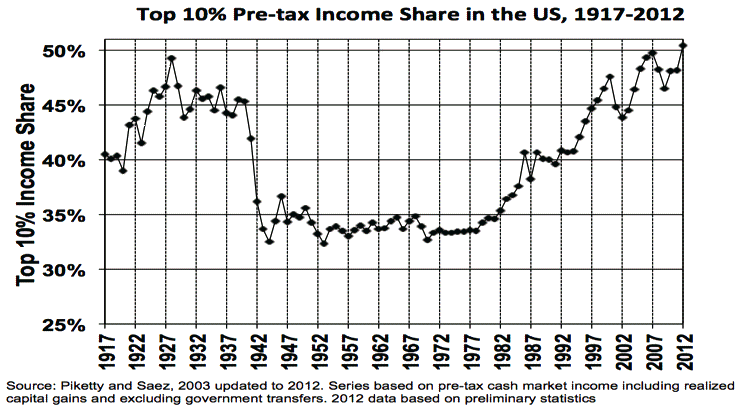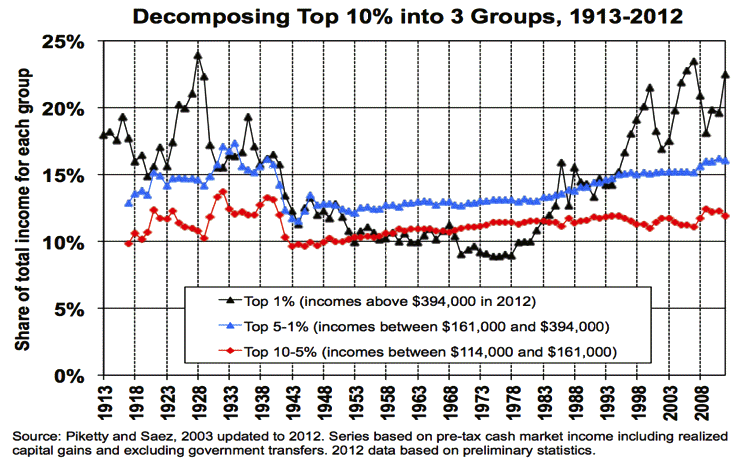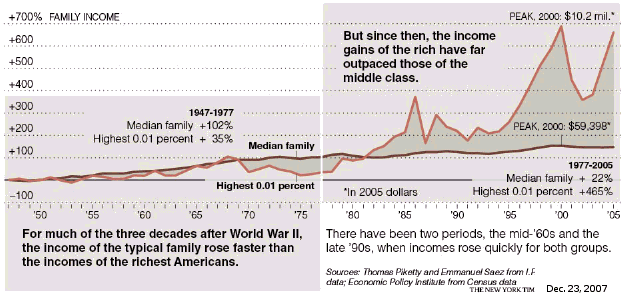Links:
World Inequality Report 2026 | World Inequality Dataabase
This page currently concentrates on difference between the rich and poor in the US. There are many other types of income Inequality, e.g. gender and race differences, developing and developed countries, regional differences, ...
Family Income:
How the American middle class has changed in the past five decades
"Middle-income" adults in 2021 are those with an annual household income that was two-thirds to double the national median income in 2020, after incomes have been adjusted for household size, or about $52,000 to $156,000 annually in 2020 dollars for a household of three.
Percent pf population in the middle class 1960's 50% 1970 62% 2022 42%"middle-income" adults in 2021 are those with an annual household income that was two-thirds to double the national median income in 2020, after incomes have been adjusted for household size, or about $52,000 to $156,000 annually in 2020 dollars for a household of three.
Median income of middle-class households in 2020 was 50% greater than in 1970 ($90,131 vs. $59,934),
The rise in income from 1970 to 2020 was steepest for upper-income households. Their median income increased 69% during that timespan, from $130,008 to $219,572.


Share of national income claimed by top 10%


An article "Technology and Inequality" in the Nov-Dec, 2014 MIT Technology Review says, "The Inequality between the rich and everyone else is larger than ever in the United States and increasing in much of Europe. Why?:" It asks if technology is the cause. The answer is technology may have something to do with with it, but there are other problems.
1. Executives make ridiculous salaries with no link between pay and performance.
2. Elimination of middle class jobs thru automation
3. People in well to do families still have a better chance of getting a good education.
4. In Europe inherited wealth grows faster than earned wealth.
The Inequality between wages with a post-grad degree and less education is widening. The article says that better education is very important in narrowing the gap.
They reference Robert Solow, nobel laureate economics professor at MIT who wrote a review "Thomas Piketty is Right", of Piketty's 2013 best seller "Capital in the Twenty-First Century" for the New Republic. He agrees with Piketty that a more progressive tax might work in Europe, but it will never pass here.
A central point of Piketty's book (a 700 page tome) is the simple statement r > g, where r is the average return on capital and g is the economic growth rate. When the rate of return on capital exceeds the growth rate (which he says is what happened until the beginning of the 20th century and is likely to happen again as growth slows), then the money that rich people make from their wealth piles up while wages rise more slowly if at all.
Since the 1950s, economics has been dominated by the idea--notably formulated by Simon Kuznets, a Harvard economist and Nobel laureate--that inequality diminishes as countries become more technologically developed and more people are able to take advantage of the resulting opportunities. Many of us suppose that our talents, skills, training, and acumen will allow us to prosper; it is what economists like to call "human capital." But the belief that technological progress will lead to "the triumph of human capital over financial capital and real estate, capable managers over fat cat stockholders, and skill over nepotism" is, writes Piketty, "largely illusory."

The top one percent of households received 21.8 percent of all pre-tax income in 2005, more than double what that figure was in the 1970s.
In 1979, the average income of the top 5 percent of families was 11.4 times as large as the average income of the bottom 20 percent. In 2005, the ratio was 20.9 times. (EPI, State of Working America 2006-07.
Source: By the Numbers inequality.org
Salary spread:
The ratio of the compensation of CEOs to the average worker in 1974 was 35 to 1; in 1995 it was 150 to 1.
Wealth (assets):
The inequality in wealth is even greater than that of income.
In March 2006 Forbes reported 793 billionaires in the US with combined net worth of $2.6 trillion. In March 2007 Forbes reported 946 billionaires in the US with combined net worth of $3.5 trillion. That is a 1-year increase of 19% in the number of billionaires and an increase of $35% in their net worth during a time of increasing poverty. Severe poverty is at its highest point in three decades.
(732) 662- Household distribution of net worth (1998), i.e. total value of assets:
| Percent of owners | Net worth | Cumulative Percent | Cumulative net worth |
|---|---|---|---|
| Top 0.5% | 25.6% | Top 0.5% | 25.6% |
| Next 0.5% | 8.4% | Top 1% | 34.0% |
| Next 4% | 23.4% | Top 5% | 57.4% |
| Next 5% | 11.4% | Top 10% | 68.8% |
| Next 10% | 12.8% | Top 20% | 81.6% |
| Last 80% | 18.5% | All 100% | 100% |
The size of the 2014 bonus pool paid to securities industries employees in New York City was $28.5 billion. Dividing this total among 167,800 workers yields an average bonus of $172,860.
$28 billion is roughly double the total earnings of all Americans who work full time at the federal minimum wage. 1.03 million full-time workers paid an hourly wage of $7.25 or less.
See All You Need to Know About Income Inequality, in One Comparison - NYTimes.com
25% of families who rent their homes spend more than 50% of their income on rent.
Hailed by the Wall Street Journal as one of the best books of 2022, The Myth of American Inequality demonstrates that the federal government egregiously overstates the degree of inequality and poverty in the world’s wealthiest nation. In doing so, the authors--a former United States senator, eminent economist, and a former senior leader at the Bureau of Labor Statistics-- challenge the prevailing consensus that income inequality is a growing threat to American society. Getting the facts straight reveals that the key measures of well-being are greater than the official statistics of the country would lead us to believe. Income inequality is lower today than at any time in post- World War II America. The facts reveal a very different and better America than the one that is currently described by policy advocates across much of the political spectrum. The updated edition brings will challenge political debate throughout the 2024 election season and provide clear and convincing evidence that the American Dream is alive and well.